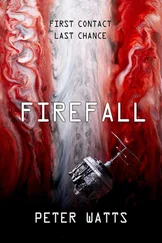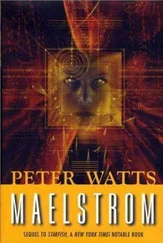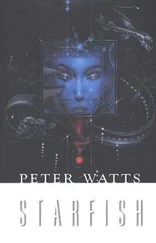Peter Watts - Malak
Здесь есть возможность читать онлайн «Peter Watts - Malak» весь текст электронной книги совершенно бесплатно (целиком полную версию без сокращений). В некоторых случаях можно слушать аудио, скачать через торрент в формате fb2 и присутствует краткое содержание. Год выпуска: 2010, Жанр: Фантастика и фэнтези, на английском языке. Описание произведения, (предисловие) а так же отзывы посетителей доступны на портале библиотеки ЛибКат.
- Название:Malak
- Автор:
- Жанр:
- Год:2010
- ISBN:нет данных
- Рейтинг книги:5 / 5. Голосов: 1
-
Избранное:Добавить в избранное
- Отзывы:
-
Ваша оценка:
- 100
- 1
- 2
- 3
- 4
- 5
Malak: краткое содержание, описание и аннотация
Предлагаем к чтению аннотацию, описание, краткое содержание или предисловие (зависит от того, что написал сам автор книги «Malak»). Если вы не нашли необходимую информацию о книге — напишите в комментариях, мы постараемся отыскать её.
Malak — читать онлайн бесплатно полную книгу (весь текст) целиком
Ниже представлен текст книги, разбитый по страницам. Система сохранения места последней прочитанной страницы, позволяет с удобством читать онлайн бесплатно книгу «Malak», без необходимости каждый раз заново искать на чём Вы остановились. Поставьте закладку, и сможете в любой момент перейти на страницу, на которой закончили чтение.
Интервал:
Закладка:
Malak,
“An ethically-infallible machine ought not to be the goal. Our goal should be to design a machine that performs better than humans do on the battlefield, particularly with respect to reducing unlawful behaviour or war crimes.”
– Lin et al , 2008: Autonomous Military Robotics: Risk, Ethics, and Design“[Collateral] damage is not unlawful so long as it is not excessive in light of the overall military advantage anticipated from the attack.”
– US Department of Defence, 2009IT IS SMART but not awake.
It would not recognize itself in a mirror. It speaks no language that doesn’t involve electrons and logic gates; it does not know what Azrael is, or that the word is etched into its own fuselage. It understands, in some limited way, the meaning of the colours that range across Tactical when it’s out on patrol – friendly Green, neutral Blue, hostile Red – but it does not know what the perception of colour feels like.
It never stops thinking, though. Even now, locked into its roost with its armour stripped away and its control systems exposed, it can’t help itself. It notes the changes being made to its instruction set, estimates that running the extra code will slow its reflexes by a mean of 430 milliseconds. It counts the biothermals gathered on all sides, listens uncomprehending to the noises they emit –
–  –
–
– hartsandmyndsmyfrendhartsandmynds –
– rechecks threat-potential metrics a dozen times a second, even though this location is secure and every contact is Green.
This is not obsession or paranoia. There is no dysfunction here. It’s just code.
It’s indifferent to the killing, too. There’s no thrill to the chase, no relief at the obliteration of threats. Sometimes it spends days floating high above a fractured desert with nothing to shoot at; it never grows impatient with the lack of targets. Other times it’s barely off its perch before airspace is thick with SAMs and particle beams and the screams of burning bystanders; it attaches no significance to those sounds, feels no fear at the profusion of threat icons blooming across the zonefile.
–  –
–
– thatsitthen. weereelygonnadoothis? –
Access panels swing shut; armour snaps into place; a dozen warning registers go back to sleep. A new flight plan, perceived in an instant, lights up the map; suddenly Azrael has somewhere else to be.
Docking shackles fall away. The Malak rises on twin cyclones, all but drowning out one last voice drifting in on an unsecured channel:
– justwattweeneed. akillerwithaconshunce. –
The afterburners kick in. Azrael flees Heaven for the sky.
Twenty thousand meters up, Azrael slides south across the zone. High-amplitude topography fades behind it; corduroy landscape, sparsely tagged, scrolls beneath. A population centre sprawls in the nearing distance: a ramshackle collection of buildings and photosynth panels and swirling dust.
Somewhere down there are things to shoot at.
Buried high in the glare of the noonday sun, Azrael surveils the target area. Biothermals move obliviously along the plasticized streets, cooler than ambient and dark as sunspots. Most of the buildings have neutral tags, but the latest update reclassifies four of them as UNKNOWN. A fifth – a rectangular box six meters high – is officially HOSTILE. Azrael counts fifteen biothermals within, Red by default. It locks on –
– and holds its fire, distracted.
Strange new calculations have just presented themselves for solution. New variables demand constancy. Suddenly there is more to the world than wind speed and altitude and target acquisition, more to consider than range and firing solutions. Neutral Blue is everywhere in the equation, now. Suddenly, Blue has value.
This is unexpected. Neutrals turn Hostile sometimes, always have. Blue turns Red if it fires upon anything tagged as FRIENDLY, for example. It turns Red if it attacks its own kind (although agonistic interactions involving fewer than six Blues are classed as DOMESTIC and generally ignored). Noncombatants may be neutral by default, but they’ve always been halfway to hostile.
So it’s not just that Blue has acquired value; it’s that Blue’s value is NEGATIVE. Blue has become a cost .
Azrael floats like three thousand kilograms of thistledown while its models run. Targets fall in a thousand plausible scenarios, as always. Mission objectives meet with various degrees of simulated success. But now, each disappearing blue dot offsets the margin of victory a little; each protected structure, degrading in hypothetical crossfire, costs points. A hundred principle components coalesce into a cloud, into a weighted mean, into a variable unprecedented in Azrael’s experience: Predicted Collateral Damage .
It actually exceeds the value of the targets.
Not that it matters. Calculations complete, PCD vanishes into some hidden array far below the here-and-now. Azrael promptly forgets it. The mission is still on, red is still red, and designated targets are locked in the cross-hairs.
Azrael pulls in its wings and dives out of the sun, guns blazing.
As usual, Azrael prevails. As usual, the Hostiles are obliterated from the battlezone.
So are a number of Noncombatants, newly relevant in the scheme of things. Fresh shiny algorithms emerge in the aftermath, tally the number of neutrals before and after. Predicted rises from RAM, stands next to Observed: the difference takes on a new name and goes back to the basement.
Azrael factors, files, forgets.
But the same overture precedes each engagement over the next ten days; the same judgmental epilogue follows. Targets are assessed, costs and benefits divined, destruction wrought then reassessed in hindsight. Sometimes the targeted structures contain no red at all, sometimes the whole map is scarlet. Sometimes the enemy pulses within the translucent angular panes of a PROTECTED object, sometimes next to something Green. Sometimes there is no firing solution that eliminates one but not the other.
There are whole days and nights when Azrael floats high enough to tickle the jet stream, little more than a distant circling eye and a signal relay; nothing flies higher save the satellites themselves and – occasionally – one of the great solar-powered refuelling gliders that haunt the stratosphere. Azrael visits them sometimes, sips liquid hydrogen in the shadow of a hundred-meter wingspan – but even there, isolated and unchallenged, the battlefield experiences continue. They are vicarious now; they arrive through encrypted channels, hail from distant coordinates and different times, but all share the same algebra of cost and benefit. Deep in Azrael’s OS some general learning reflex scribbles numbers on the back of a virtual napkin: Nakir, Marut and Hafaza have also been blessed with new vision, and inspired to compare notes. Their combined data pile up on the confidence interval, squeeze it closer to the mean.
Foresight and hindsight begin to converge.
PCD per engagement is now consistently within eighteen percent of the collateral actually observed. This does not improve significantly over the following three days, despite the combined accumulation of twenty-seven additional engagements. Performance vs. experience appears to have hit an asymptote.
Stray beams of setting sunlight glint off Azrael’s skin, but night has already fallen two thousand meters below. An unidentified vehicle navigates through that advancing darkness, on mountainous terrain a good thirty kilometres from the nearest road.
Читать дальшеИнтервал:
Закладка:
Похожие книги на «Malak»
Представляем Вашему вниманию похожие книги на «Malak» списком для выбора. Мы отобрали схожую по названию и смыслу литературу в надежде предоставить читателям больше вариантов отыскать новые, интересные, ещё непрочитанные произведения.
Обсуждение, отзывы о книге «Malak» и просто собственные мнения читателей. Оставьте ваши комментарии, напишите, что Вы думаете о произведении, его смысле или главных героях. Укажите что конкретно понравилось, а что нет, и почему Вы так считаете.








